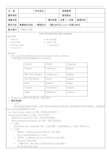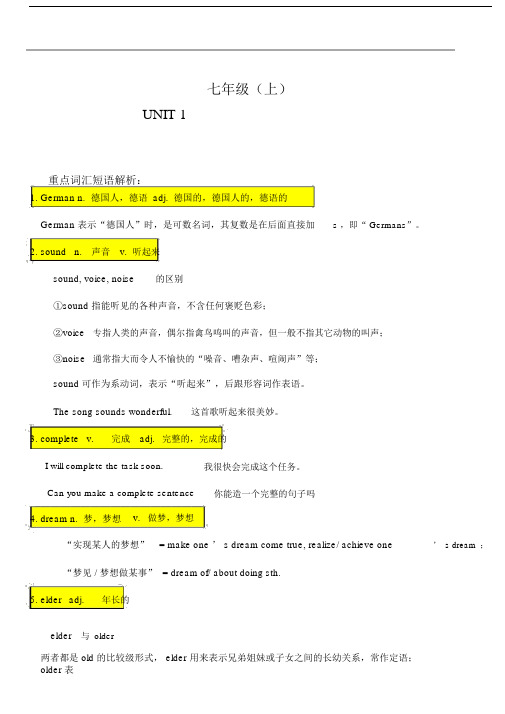上海牛津版英语七年级上册七上7AUnit9U9同步讲义教案
(完整版)沪教牛津版初中英语七年级上册全套教学案

7A UNIT 1 Making friendsⅠ重点单词:world n. 世界country n. 国家Japan n.日本Germany n. 德国German adj.德国的n.德国人grammar n.语法 blog n. 博客sound n. 声音everyone n.人人(谓语动词要用单数)hobby n.爱好(复数hobbies)age n. 年龄elder adj. 年长的dream n. 梦想complete v. 完成us pron.我们 yourself pron.你自己friendly adj. 友爱的engineer n. 工程师 flat n.公寓mountain n. 山Ⅱ重点短语:1.colse to 接近 = near 反义词:far (away)from 远离2.go to school 去上学3.be good at 擅长 =do well in 反义词:be bad /poor at=do badly in不擅长4.make friends with 与……交朋友 make friends 交朋友5.all over 遍及6.I’d like to=I would like to 愿意Ⅲ重点句型:1.what does···mean?2.welcome to3.I like···because···4.My dream is to be··.5.How old is/are ····?6.What does ····do?Ⅴ详细讲解:1.Read a G erman girl’s blog.(Page1)(1)German :① adj.德国的(德国人的,德语的)This is a German car.② n.德国人,是可数名词。
牛津上海版初一七年级上英语unit7同步复习教案

(Ox) 7A Unit 7 Signs around usPART ONE I.V ocabulary1.Hike2.Direction3.Warning4.Instruction5.Silenceeful7.Camp 8.Player9.Dice10.Rollnd12.Miss13.Luckeful Expressionseful Structures/Grammar1.We must not smoke here.2.There is a shelter here.3.The player who rolls a six on the dice goes first. Then all the other players take turnsto roll the dice.4.If you land on a sign, you must say what it means. If you don’t know, you miss aturn.PART TWOI.Word Formation1.play(n.)________2.warn(n.)________e(adj.)________4.direct(n.)________5.cross(prep.)________6.lose(adj.)________7.quiet(adv.)________8.fish(n.)________9.friend(n.)________ 10.record(n.)________11.different(n.)________12.react(n.)________13.different(adv.)________14.live(adj.)________15.speak(n.)________plete the sentence with the given word in the correct form.1.we must not leave rubbish here. This is a ________ sign. (warn)2.We need four ________to play this game together. (play)3.Thank you for your ________ information. (use)4.Would you like to go ________ with us? (camp)5.I’m afraid you took the wrong ________.(direct)6.I'm glad to get an ____________ to the prom. (invite)7.Do you know the ____________ boy from the left? (nine)8.I've been to Beijing ____________. (two)9.Have you visited the Shanghai Expo ____________ Center? (exhibit)10.Tommy ____________ sue a few yours ago. (marry)III.Sentence Transformation1.Tian’anmen Square can hold 1 million people.(对划线部分提问)________ ________ people can Tian’anmen Square hold?2.How much is it?(同义句)How much ________ it ________?3. My brother often ate too many sweets in the past.(保持原句意思)My brother ____________ ____________ eat too many sweets.4. Last night Jim didn’t have a shower. I didn’t have a shower, either. (保持原句意思)Last night Jim didn’t have a shower. Neither __________ _________.5. Let’s travel to Beijing during Chinese New Year holidays. (保持原句意思)Why __________ ______________ travel to Beijing during Chinese New Year holiday?6. I watched too much television last week. (对划线部分提问)____________ did you __________ last week?IV.Multiple Choice1. Cormorant fishing isimportant traditional skill in ancient China.A) aB) anC) theD) /2. Y ousafzai became the youngest ever winner of a Nobel PrizeOctober 10, 2019.A) atB) inC) to D) on3. The girl couldn't believe her eyes when she sawin the mirror.A) herB) herself C) hers D) she4.Would you please give me someon memorizing words quickly?A) tipB) suggestion C) ideaD) advice5. If anything dangerous happensyou at school, let your teachers know.A) atB) on C) to D) by6. The twins look so similar that I always mistake the one for ___ .A) the other B) the othersC) anotherD) other7. I like my mother's way of cooking fish because it tastes ___ .A) well B)bad C) nice D) terribly8.Jenny was reading a book yesterday, someone knocked at the door.A) SinceB) WhileC) Although D) If9.It's a pity that I didn't think of ringing you ___ .A) earlierB) earliestC) early D) the earliest10.Janebe in the office. She has gone to the meeting room.A) mustn'tB) needn'tC) can't D) shouldn't11.exciting music the recording is playing!A) WhatB) What a C) What anD) How12.Blaine plans to study art in the UK. His friendshim off at the airport next week.A) see B)sawC) will see D) would do13.Many peopleof Ebola virus (埃博拉病毒)in the past a few months.A) die B)died C) have diedD) will die14. To remember things accurately, we don't allow other thoughtsour mind.A) enterB) to enter C) enteringD) entered15.carefully, Lisa! There's a church ahead.A) DriveB) To drive C) Drove D) Driving16. — ______ will he finish reading the comic strips?— In three minutes.A) How far B) How longC) How fastD) How soon17. This is a warning sign. It means: We ________ turn left here.A) won’t B) mustn’t C)shou ldn’t D)needn’t18. ________ tell us how to got to a certain place.A)Directions B)Warnings C)Information D)Instructions19.— Would you mind if I open the door a little wider?— _______.A) Y ou are welcome.B) Not at all.C) That's all right. D) Y es, you are right.20. — The case is very heavy, Miss Wu. Would you like me to carry it for you? — ___________.A) With pleasure. B) No, you needn't.C) Y es, I'd love to. D) It's very kind of you.V.Reading comprehension (四号)Section A.Section BVI.Read the passage and fill in the blanks with proper words(四号)VII.Translation1.由于她的提醒,我很小心。
牛津上海版英语七年级上册《Unit 9 International Food Festival》教学

牛津上海版英语七年级上册《Unit 9 International Food Festival》教学设计2一. 教材分析《Unit 9 International Food Festival》是牛津上海版英语七年级上册的一单元,本单元主要介绍食物和饮食文化。
教材通过介绍不同国家的食物,让学生学会描述食物的特点,并能够表达自己的喜好。
本单元包括听力、口语、阅读和写作等多个方面的内容,通过多样化的活动,帮助学生提高综合语言运用能力。
二. 学情分析七年级的学生已经具备了一定的英语基础,能够进行简单的听、说、读、写。
但他们在语言表达方面还存在一定的困难,需要通过大量的练习来提高。
此外,学生对于不同国家的食物和饮食文化可能了解不多,需要在课堂上进行引导和拓展。
三. 教学目标1.知识目标:学生能够掌握本单元的生词和短语,理解不同国家的食物和饮食文化。
2.能力目标:学生能够用英语描述食物的特点,并能够表达自己的喜好。
3.情感目标:通过本单元的学习,学生能够尊重和欣赏不同国家的饮食文化。
四. 教学重难点1.重点:学生能够用英语描述食物的特点。
2.难点:学生能够表达自己的喜好,并能够进行听力理解和口语表达。
五. 教学方法本节课采用任务型教学法,通过听力、口语、阅读和写作等多个方面的活动,让学生在实际操作中提高英语运用能力。
同时,采用分组合作和小组讨论的方式,激发学生的学习兴趣,培养他们的合作意识。
六. 教学准备1.教师准备:教师需要熟悉教材内容,了解学生的学习情况,准备相应的教学资源和素材。
2.学生准备:学生需要预习本单元的生词和短语,了解不同国家的食物和饮食文化。
七. 教学过程1.导入(5分钟)教师通过展示不同国家的食物图片,引导学生谈论自己喜欢的食物,从而引入本节课的主题。
2.呈现(10分钟)教师通过播放听力材料,让学生听懂并理解不同国家的食物和饮食文化。
然后,教师呈现本节课的生词和短语,让学生进行学习和记忆。
牛津上海版英语七年级上册Unit7教学设计

(三)情感态度与价值观
在本章节的学习中,教师将引导学生培养以下情感态度与价值观:
1.培养学生对英语学习的兴趣和自信心,激发学生的学习积极性。
2.培养学生的环保意识,通过学习本单元内容,认识到保护环境的重要性,如:“We should recycle the batteries to protect the environment.”
难点:对于学生而言,一般现在时的正确使用,特别是在句子中的动词形式变化,以及阅读文章中的长难句理解能力,将是学习的难点。
2.重点:提高学生的阅读理解能力,使其能够从文章中获取有效信息,对机器人的功能和应用有深入的理解。
难点:学生在阅读过程中,对于文章细节的把握和主旨的提炼存在困难,需要教师通过有效的教学策略进行引导。
7.互动交流:鼓励学生利用网络平台,用英语与同学交流关于机器人的看法和观点。此举旨在提高学生的跨文化交流能力,拓宽他们的国际视野。
2.针对学生的个体差异,我计划实施分层教学:
-对于基础薄弱的学生,设计基础性练习,巩固词汇和语法基础。
-对于基础较好的学生,提供拓展性练习,如写一篇关于机器人的小短文,以提高他们的写作能力。
3.情感态度的培养:
-创设轻松愉快的学习氛围,鼓励学生大胆开口说英语,增强他们的自信心。
-通过小组合作活动,培养学生的团队协作精神和集体荣誉感。
3.培养学生关爱他人、乐于助人的品质,通过学习机器人的功能,了解人工智能在生活中的应用,从而关注弱势群体,如:“The robot can help the disabled people do some daily tasks.”
4.培养学生的创新精神,鼓励学生思考如何利用机器人技术改善生活,为社会发展做出贡献。
牛津上海版英语七年级上册全册教案

Unit 3 Friends from other countries重点短语1. most of2. for example3. more than4. c all sb. sth.[来源:学+科+网]5. far away from6. read about7. write to sb.[来源:学科网ZXXK]语法知识1. The words about different countries and people in these countries.不同的国家名称和这些国家的人们的叫法。
Country People Languag eCanada[来源:学&科&网]Canadian(s) EnglishThe USA/ America America n(s) EnglishThe UK/ Britain British EnglishIndia Indian(s) IndianAustralia Australian(s) EnglishJapan[来源:学&科&网]Japanese(s) Japanese[来源:学,科,网Z,X,X,K]2. 用there be句型表示客观存在(就近原则)3.现在完成时(一)含义现在完成时用来表示现在之前已发生或完成的动作或状态,但其结果却和现在有联系, 也就是说, 动发生在过去但它的影响现在还存在。
e.g. I have lost my wallet. (含义是:现在我没有钱花了。
)Jane has laid the table.(含义是:已可以吃饭了。
)Michael has been ill.(含义是:现在仍然很虚弱。
)He has returned from abroad. (含义是:现在已在此地)(二)结构助动词have /has+动词过去分词,主语为第三人称单数用has,其他人称用have 。
(三)句型1、肯定句:主语+have /has+动词过去分词+其他。
牛津上海版七年级英语上册教学设计:Unit9InternationalFoodFestival

难点:部分学生听说能力较弱,对课堂活动的参与度不高,需要在教学过程中给予个别关注和指导。
3.重点:培养学生尊重和欣赏不同国家饮食文化的态度,树立国际视野。
难点:如何引导学生从内心深处接纳和尊重不同文化,形成正确的价值观。
7.课后实践:鼓励学生在课后参与家庭、社区的美食制作和分享活动,将所学知识运用到实际生活中。
8.评价方式:采用多元化的评价方式,如:小组评价、自我评价、教师评价等,关注学生在知识、技能、情感态度等方面的全面发展。
四、教学内容与过程
(一)导入新课
1.教学活动:利用多媒体展示国际美食节的图片和视频,引导学生关注不同国家的饮食文化。
1.教学活动:将学生分成小组,每组选择一种国家美食,讨论其特点、制作方法和相关节日。
2.教师指导:引导学生运用所学词汇和时态,进行小组讨论,提高跨文化交际能力。
3.小组分享:每组选派一名代表,用英语介绍所选国家美食,如:“In Italy, pizza is a famous dish. It has a crispy crust and various toppings.”
d.写作练习:要求学生写一篇关于国际美食节的短文,描述自己喜欢的美食和节日活动。
2.教师指导:针对学生练习中的问题,给予个别辅导,提高他们的实践能力。
(五)总结归纳
1.教学内容:对本节课所学词汇、语法、饮食文化等进行总结。
2.学生分享:让学生谈谈本节课的收获,以及在国际美食节活动中所了解到的有趣事物。
3.能够理解和运用目标句型,如:“What's your favorite food?”, “How do you like this dish?”等,进行关于食物和节日的交流。
七年级英语上册 Unit 9 International Food Festival教学设计 牛津上海版

Unit 9 International Food Festival教学目标At the end of the class, the students are expected to be able to:(1) master the phrases and sentence structures they have learned.(2) use targeted vocabularies and sentence structures to talk about something about an international food festival.(3) use the simple future tense to talk about events which will occur soon.(4) get to know different eating habits and learn to enjoy the cultures of different countries.(5) have good business sense.教材分析本节课为牛津英语7A的Module 3, Unit 9(International Food Festival)。
在牛津教材中, Food这个话题反复出现。
在六年级时,学生就学过“Food and drinks”,所以这课的主题对学生来说不是很陌生。
这一课时中,学生将围绕着“国际食品节”这个话题进行一系列的活动,通过看视频、补全海报,对子操练、小组调查、表格填写、学生报告等不同的课堂活动来复习一些常见的食品名称,练习国家名称及其国籍的用法,并借此了解中西方不同的饮食文化,拓展视野,树立一定的世界观。
此外,本课的另一个重点就是帮助学生操练和掌握销售和购买过程中的情景目标语言,如,询问食品价格和数量等。
而这个活动的目的不是只局限于语言训练,更重要的是通过学生间简单的“买卖交易”,从小培养学生一种商业意识,教授学生一些生活技能,帮助学生学会学习,学会生活。
沪教牛津版本初中七年级的上册的讲义.docx

七年级(上)UNIT 1重点词汇短语解析:1.German n. 德国人,德语 adj. 德国的,德国人的,德语的German 表示“德国人”时,是可数名词,其复数是在后面直接加s ,即“ Germans”。
2. sound n.声音v.听起来sound, voice, noise的区别①sound 指能听见的各种声音,不含任何褒贬色彩;②voice专指人类的声音,偶尔指禽鸟鸣叫的声音,但一般不指其它动物的叫声;③noise通常指大而令人不愉快的“噪音、嘈杂声、喧闹声”等;sound 可作为系动词,表示“听起来”,后跟形容词作表语。
The song sounds wonderful.这首歌听起来很美妙。
3. complete v.完成adj.完整的,完成的I will complete the task soon.我很快会完成这个任务。
Can you make a complete sentence你能造一个完整的句子吗4. dream n. 梦,梦想v.做梦,梦想“实现某人的梦想”= make one ’ s dream come true, realize/ achieve one’ s dream;“梦见 / 梦想做某事”= dream of/ about doing sth.5. elder adj.年长的elder与older两者都是 old 的比较级形式, elder 用来表示兄弟姐妹或子女之间的长幼关系,常作定语;older 表1示新旧程度、年大小关系,可作表也可作定。
My elder sister is older than me.我的姐姐比我大。
6. friendly adj.友好的,友的以 -ly尾的并不一定是副,常以-ly 尾的形容: lovely, lively, lonely, daily, ,7.pron. 你自yourself己反身代:myself yourself himself herself itself ourselves yourselves themselves 我自己你自己他自己她自己它自己我自己你自己他自己常反身代构成的短:enjoy oneself = have a good time玩得开心help oneself to,, 随便,,by oneself独自地,独地8. livewith和⋯⋯住在一起Who do you live with你和住一起9. close to(在空、上)接近、靠近My house is close to the park.我的房子离公园很近。
- 1、下载文档前请自行甄别文档内容的完整性,平台不提供额外的编辑、内容补充、找答案等附加服务。
- 2、"仅部分预览"的文档,不可在线预览部分如存在完整性等问题,可反馈申请退款(可完整预览的文档不适用该条件!)。
- 3、如文档侵犯您的权益,请联系客服反馈,我们会尽快为您处理(人工客服工作时间:9:00-18:30)。
学员编号:年级:课时数:学员姓名:YYY 辅导科目:英语学科教师: XX授课类型T Unit9(牛津7上)基础知识梳理星级★★★1、使学生能够基本掌握牛津7年级上册Unit9中的基础词汇及重要句型;教学目标T同步-U9基础知识梳理(建议2-5分钟)It was a sunny day. We decided to have a picnic outside the city. In the morning, we took an early bus to a mountain. It was quite a colorful world. There were green trees, orange leaves,red peach blossoms. At noon, we reached the place.we sat by the1river bank and took out a lot of things, such as bread, orange juice, apples, cakes, eggs and so on. But all of a sudden, it began to rain. Unluckily there was no shelter nearby. We had to take a bus to go back home in a hurry. What an unforgettable picnic it was!批注:通过图片及这篇小文章来引出今天的主题,同时可以和学生进行对话,询问学生最想在食物节上吃到什么,引起学生对于本课的兴趣。
(建议20-25分钟)一、词汇Words1. homeless:adj. 无家可归的【知识拓展】home:n.家,家庭& adj. 家用的,国内的& adv. 在家,在国内After the terrible earthquake , a lot of people became homeless. 地震过后,许多人变得无家可归。
批注:可以和学生拓展careless( 粗心的) , helpless(无助的), hopeless ( 无望的)2. pie n. 果馅饼,果馅派Help yourself to this pie .请吃点苹果馅饼。
3. firstly adv. 第一,首先【指点迷津】first ,firstly 都作副词用,在表示‘依次列举所述各点’时,两者没有什么区别,可以换用。
例如:First/firstly, I’ll mention its advantages, and then I’ll mention its disadvantages.Your room is quite untidy. 你的房间真乱。
批注:这里可以和学生一起复习一下基数词变序数词的规则,尤其是第一,第二,第三,第五,第九,第十二这几个高频考点。
24. flour n. 面粉Bread is made from flour. 面包是由面粉做的。
批注:提示学生注意flour是不可数的。
5. mixture n. 混合物This drink is a mixture of three different sorts.这个饮料是由三种不同的东西混合而成的。
【知识拓展】mix v. 混合;搅拌He mixed his guests a salad. 他给客人拌色拉。
6. wide adj. 宽度为……的;宽的The lake is about six miles wide .这条湖约六英里。
【知识拓展】wide还可以作副词,意为‘广大的,全部的’。
例如:The children were still wide awake , when the clock struck twelve for the New Year’s Day.当昔年的钟声敲响12下时,孩子们仍然完全醒着。
批注:帮助学生拓展widely的用法,为副词,广泛地,具有抽象意义。
7. oven . 烤箱It is like an oven in here; please open the window.这里热的像火炉,请把窗户打开。
8. sincere adj. 真诚的,诚挚的【词性转化】sincerely: adv. 真诚地,真心地批注:告诉学生写信时收尾可以用yours sincerely 表示您最真诚的朋友。
9. bake v.烤,烘焙【词性转化】bakery: n.面包店baker: n. 面包师3批注:可以联想rob, robber, robbery,同时提醒学生遇到这个单词的词形转化题时必须要翻译题干,来确定要填哪个单词。
10. add: vi. 加;增加;【词性转化】addition: n. 增加, 附加物, 加,加法additional: a. 附加的, 另外的二、重要句型Important Sentences structures1. take care of 关心;照顾take care of与look after意思相近。
例如:You should take care of/look after your health. 你应该注意自己的健康状况。
批注:此处一定要和学生拓展照顾的好的表达方式:1,take good care of 2, look after well2. There is going to be…将要有……There is going to be a sports meeting, isn’t there?将要举行一场运动会,是吗?批注:There is going to be结构中的be不可以用have来代替。
3.国名的形容词形式用于修饰名词,和表示国籍的名词形式一样。
请看下面的对照表:国家(名词)国籍(名词)……国的(形容词)语言(名词)China Chinese Chinese ChineseThailand Thai Thai ThaiSpain Spanish Spanish SpanishJapan Japanese Japanese JapaneseRussia Russian Russian Russian 国家(名词)国籍(名词)……国的(形容词)语言(名词)Italy Italian Italian ItalianFrance French French FrenchGermany German German GermanKorea Korean Korean Korean4批注:这里可以打一张简易的世界地图,和学生一起做个小游戏,快速指出其中的国家,让学生用英语说出国家的名字4. 本单元出现了hope的两种用法:①hope后跟从句,从句通常用将来时,表示“希望以后……”,如:I hope that I will have more time to help Mum do the housework. 我希望以后又更多的时间帮助妈妈做家务。
②hope后跟动词不定式,即hope to do sth. ,表示“希望做某事”,如:I hope to do more exercise to lose some weight. 我希望做更多的运动来减肥。
I hope that youwill be all right.5.句型What do you think about…? 用以询问人们对某一具体事务的看法。
What do you think about this film? 你认为这部电影怎么样呢?What do you think about having a barbecue with us? 你觉得与我们一起去烧烤如何?【注意】此句型与How do you like…? 同义。
如:How do you like this book? 你觉得这本书怎么样?(建议5-10分钟)Ⅰ. Choose the best answer.1. I hope ________ the poor children.A. to helpB. helpingC. thatD. /2. I hope that he _________ playing computer games.A. stopB. stopsC. will stopD. to stop3. Next, _________________________ t he shapes with flour.A. makeB. putC. siftD. sprinkle4.The dish tastes ____________________________ .A. wonderfullyB. badlyC. deliciousD. nicely5. You can buy this kind of ______________ flour in the supermarket.A.self-raising B. self-rising C. self-rise D. self-raise6. I paid _________________________ for these sweets.56sincere1. Henry was __________about reconciling with his brother.2. We treat our roommates _________.Keys: 1. home, homeless 2.Thai , Thailand 3.firstly, first 4.second , secondly 5.width, widely, wide, widen .6. bake, baker, bakery. 7. sincere , sincerelyscore:____________ (28小题,共28分)(建议2-5分钟)放电影回顾式学习法批注:第一步采用放电影学习法,让学生自己回忆在本模块学到了哪些知识点;如果学生回答的是一些凌乱且琐碎的知识点,这个时候老师可以让学生翻看前面的知识点进行总结。
第二步是错题再次回顾总结,在“斩妖除魔”环节,学生做了题目,需要再次让学生总结出现错误的原因及下次如何避免。
Step 1. 思考回忆所学知识点,并将所学知识点列在下面key word:homeless,wide,bake 的用法Important Sentences structures:Step 2. 错题回顾7。
